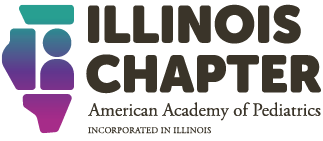Housing Insecurity
Empowering Clinicians in Supporting Stable Housing
In Illinois, housing instability remains a significant social determinant of health, particularly for children. Pediatric populations experiencing homelessness are at heightened risk for: chronic medical conditions, food insecurity, malnutrition, delays in psychosocial development, frequent disruptions to their education.
Recognizing and addressing the factors that contribute to homelessness is essential to improving long-term health outcomes for these children. Pediatricians in Illinois are uniquely positioned to:
- Identify risk factors and early signs of housing insecurity.
- Provide support and referrals to local community resources.
- Implement practice changes that are sensitive to housing-related health needs.
- Advocate for policy changes that address the root causes of homelessness.
By doing so, pediatricians can play a vital role in advancing health equity and ensuring that all children, regardless of housing status, have the opportunity to achieve their fullest potential here in Illinois.
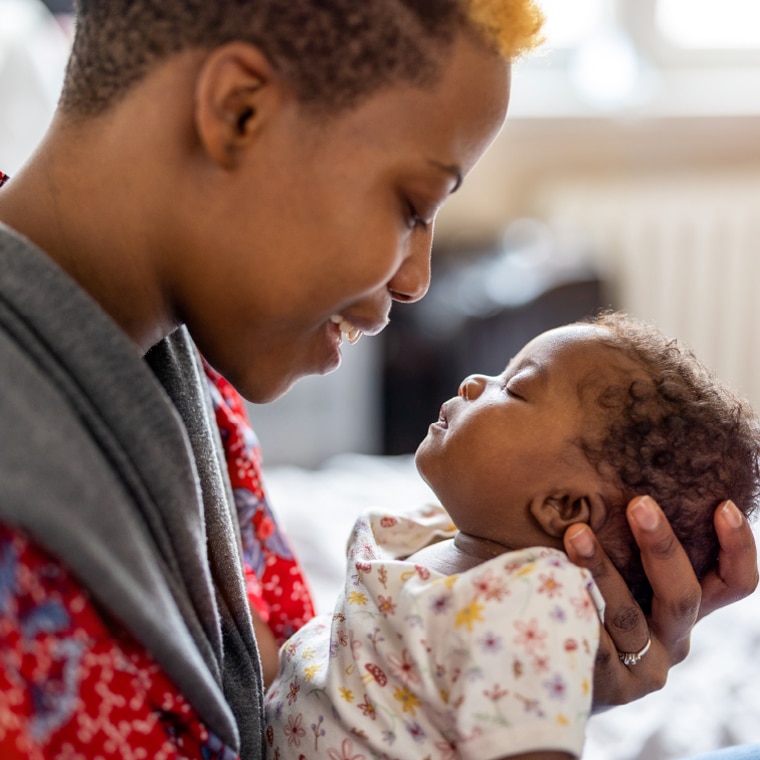
Housing is a Human Right
Facts Every Clinician Needs to Know
Principle 4 of the United Nations Declaration of the Rights of the Child proclaims that every child shall have the right to adequate nutrition, housing, recreation, and medical services, yet many children throughout Illinois are facing housing insecurity.
Infants born to persons experiencing homelessness are more likely to be born prematurely and with low birth weights, to require a ventilator upon birth, and to require admission to an intensive care unit than those born to persons who are stably housed.
A pregnant person who lives in shelters is less likely to receive well care in ambulatory settings and are about 50% more likely to use the emergency department for their care.
The majority of family members facing insecurity are children and over half of them are under 6 years old.
Approximately 80% of Chicago residents facing housing insecurity are Black.
The Scope of Housing Insecurity affecting Children in Illinois
While it’s difficult to track data due to documentation limitations, statistics show that Children are experience greater rates of housing insecurity throughout Illinois, with percentage of students who do not have permanent or adequate housing increasing from 2% in 2018 to 2.6% in 2024. The US Department of Housing & Urban development reports that:
- 11,947 Illinois residents were unsheltered, staying in an emergency shelter, or living in transitional housing on a single night of the year in 2023
- The Illinois Department of Human Services (IDHS) tallied 50,991 people receiving services in FY 2020: 30,900 received Emergency and Transitional Housing services, 11,060 received Supportive Housing services, and 9,031 people received Homeless Prevention services.
- In a preliminary report, the Illinois State Board of Education (ISBE) reported 73,119 students experiencing homelessness during the 2023-24 school year. This represents a 20% increase in students experiencing homelessness in Illinois since the 2022-23 school year. This is the highest number of students experiencing homelessness that ISBE has ever identified.
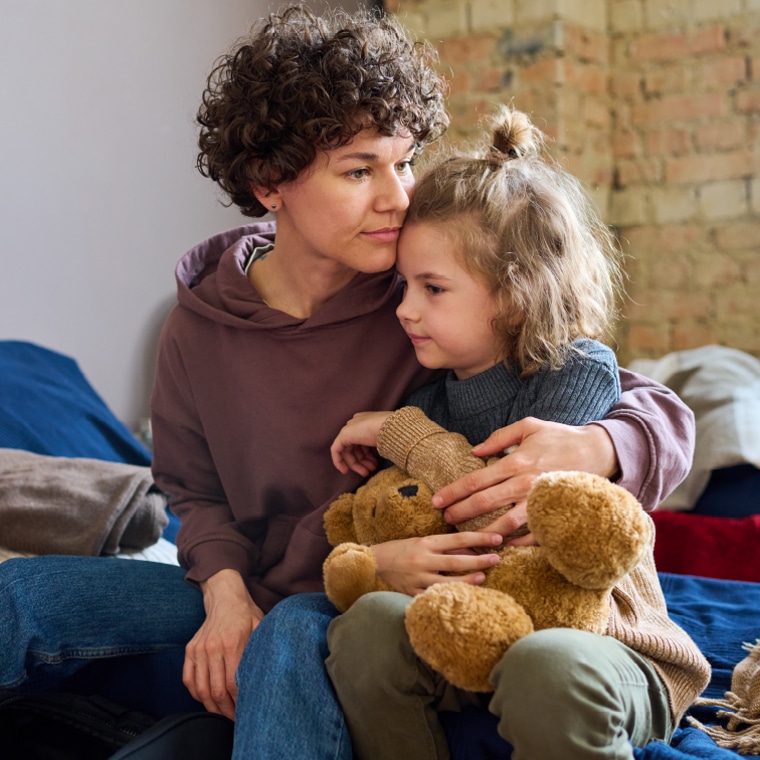
Programs & Organizations Supporting
Unhoused Populations in Illinois

First Steps
Improving Child Health & Housing in Illinois
First Steps is an ICAAP program generously funded by the Otho S. A. Sprague Memorial Institute. The program works to prevent and mitigate child health risk associated with housing insecurity, specifically focusing on children ages 0 to 6 by:
- Improving the quality of care through health care and housing cross-sector education.
- Establishing a model of care for pediatric patients facing housing insecurity.
- Enhancing systems of care and linkages between pediatric primary care, early childhood, and housing providers.
- Fostering partnerships through the Collaborative on Child Homelessness - Illinois (COCHI).
- Assuring that child health risks and health risks to pregnant persons and young children are reflected in the prioritization of housing.
- Making recommendations on what data should be collected and tracked to better understand how homelessness and housing instability affect children and pregnant persons.
Closing The Affordable Housing Gap | Interview By WBEZ Chicago
Hear from ICAAP pediatrician' Dr. Nancy Heil, ICAAP community expert, Amanda Henley, and Housing Action Illinois Policy Director, Bob Palmer, on how the lack of affordable housing put children and their families at risk and how organizations and lawmakers can close the gap.

Collaborative on Child Homelessness – Illinois (COCHI)
COCHI is a multi-disciplinary, multi-organizational coalition facilitated by ICAAP with the purpose of improving health outcomes for young children, families, and pregnant persons experiencing housing insecurity by increasing capacity and fair access to housing through a deliberate racial equity and justice lens. The Collaborative broadly defines housing insecurity to include both those who are literally homeless and those living doubled up.
Resources for Clinicians
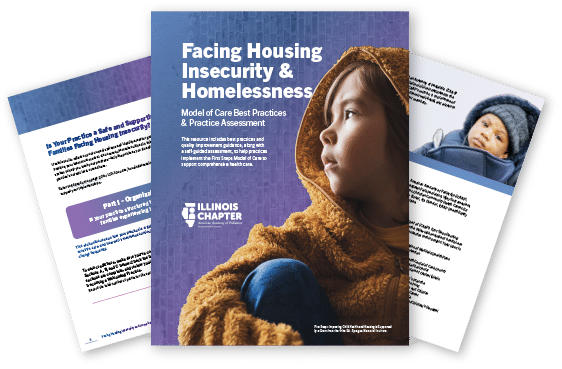
First Steps Model of Care & Practice Assessment
A comprehensive framework to transform your practice into a welcoming medical home for families facing housing insecurity.
This combined resource gives pediatric practices everything needed to support children and families experiencing unstable housing, from foundational policies and community partnerships to clinical workflows and staff training. The integrated self-assessment helps you measure your current readiness and identify concrete next steps.
What's included:
- Six core components of trauma-informed, housing-responsive care
- A self-scoring quality improvement tool with automated calculations
- Evidence-based screening questions and referral pathways
- Practical implementation guidance across organization, care delivery, and clinical systems
- Clear qualification criteria to become a recognized "Welcoming Practice"
Whether you're just beginning to address housing insecurity or looking to strengthen existing efforts, this tool meets you where you are and guides you forward.
Chicago/Cook County Housing Referral Tool for Physicians
Referral guidance for providers to share with patients when they present with housing concerns, including referral resources for families with children needing immediate shelter. unaccompanied youth and minors , persons experiencing domestic abuse, and military veterans.
Model of Care Bookmark
This downloadable bookmark provides physicians with practical tips to care for children experiencing housing insecurity, including:
- Golden Rule
- Schedule Adaptation
- Comprehensive Visits
- Resources
First Steps Webinar - A Primary Care Primer on Housing Insecurity in Children
A First Steps: Improving Child Health and Housing webinar crafted by a group of experts from across the housing and health care sectors. This webinar allows participants to understand the definitions and prevalence of homeless and housing insecurity in Chicago, learn how to sensitively address homelessness in patients, and become familiar with resources available for children and families experiencing homelessness.
Coming September 16, 2025
Housing Resources for Families in Chicago and Suburban Cook County
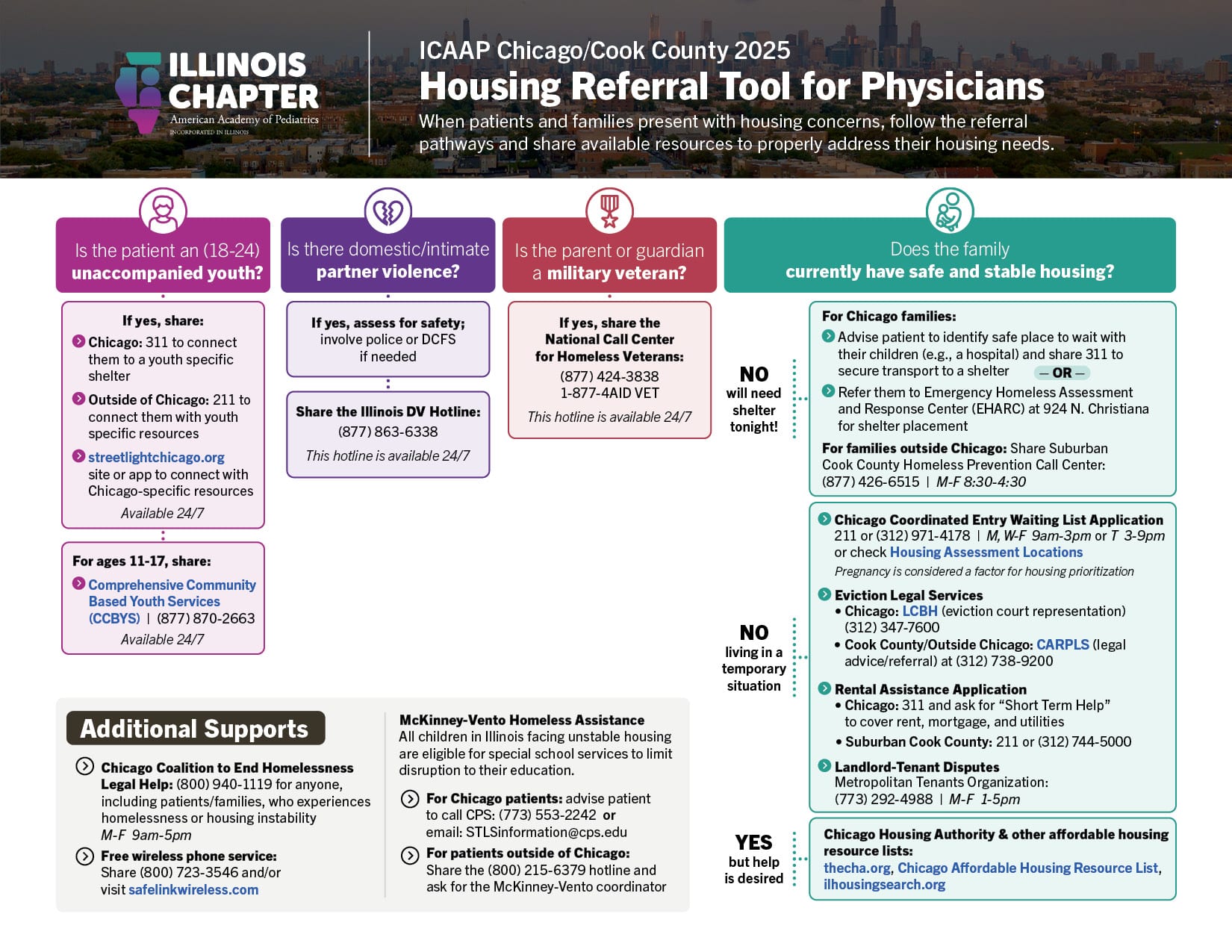
Housing Referral Tool for Physicians
When patients and families are presented with housing concerns, it is essential for physicians to be aware of the available resources and referral pathways that can assist these challenges. The Chicago/Cook County Housing Referral Tool for Physicians is a crucial resource for providers to quickly assist individuals and families. Simply follow its pathways to direct them to appropriate services and available resources to improve their housing needs.
Housing Resources for Families in Illinois
Every child deserves a safe place to call home. In this section, you’ll find housing assistance programs, emergency shelters, rent support, and tools for finding long-term, affordable housing. Whether you’re in crisis or planning ahead, these services are here to help you and your family.
When You Need Housing Help
Housing Action Illinois – Statewide Housing Referral Resources
A statewide directory of housing services organized by region. Use this tool to find local Continuums of Care (CoCs), which help coordinate housing and support services for individuals and families experiencing homelessness.
![]() 211 Hotline
211 Hotline
Dial 211 from anywhere in Illinois to connect with an operator who can help you find housing, food, mental health services, and more in your community. This is a free, confidential service available 24/7. Outside metro Chicago, 211 will route you to your nearest support network.
Emergency and Transitional Housing Providers
A statewide program offering emergency and transitional shelter for people experiencing homelessness or at risk of losing their housing. Includes links to local providers who may be connected with regional CoCs.
Homeless Youth Provider Agencies
Designed specifically for youth facing homelessness, this program offers emergency shelter, transitional housing, education and job support, and life skills development to help youth build a safe and self-sufficient future.
![]() Eviction Help Illinois Hotline
Eviction Help Illinois Hotline
Call: 1-855-631-0811
Text: 844-938-4280 (English) or 844-938-4289 (Spanish)
Free, confidential support for renters facing eviction. Get connected to legal assistance, financial aid, and housing resources across Illinois.
Illinois Housing Development Authority – Housing Help is Here
Offers rental and utility assistance, foreclosure prevention, and access to free legal help for eviction issues — including court-based support.
State Homeless Prevention Program Providers
Provides emergency assistance for individuals and families at risk of homelessness. Includes help with rent or mortgage, utilities, and case management to stabilize housing.
Public Housing Resources (HUD Illinois)
Federal housing information for Illinois residents, including access to Section 8 vouchers, public housing programs, and a hotline for those experiencing domestic violence.
lllinois Department of Children and Family Services – Norman Services
Norman Services provide housing-related support for families at risk of separation due to lack of shelter, food, or basic needs. May include emergency housing assistance or support to help reunify families.
Educational Rights & Support for Families Experiencing Homelessness
Families facing housing instability have special rights under the McKinney-Vento Homeless Assistance Act, which ensures children and youth can continue their education without disruption. These resources explain what those rights are, and how you can access them.
Rights of Families Experiencing Homelessness – Tip Sheet (Illinois Early Learning)
A simple, visual guide explaining the rights of families experiencing homelessness under the McKinney-Vento Act. Great for quick understanding and sharing.
McKinney-Vento Factsheet (English – ISBE)
Learn about eligibility and benefits under McKinney-Vento. This factsheet outlines the services available to children in temporary housing situations, such as staying with relatives due to economic hardship.
ISBE McKinney-Vento Homelessness Program Website
Official resource hub from the Illinois State Board of Education. Offers information for families and students about their educational rights under federal law.
ISBE Multi-Language Fact Sheet Printable Flyers
Flyers explaining McKinney-Vento rights are available in multiple languages including Spanish, Arabic, Chinese, Polish, and more — to ensure families of all backgrounds have access to support.
![]() ISBE School Wellness Hotline / McKinney-Vento Email
ISBE School Wellness Hotline / McKinney-Vento Email
Call (800) 215-6379 or email Homeless@isbe.net to reach the statewide McKinney-Vento coordinator. They can help answer questions or direct you to local support.
McKinney-Vento Lead Area Liaison Map (PDF)
A color-coded map showing McKinney-Vento contacts by region across Illinois. Useful for finding the right person to help in your area.
McKinney-Vento District Homeless Liaison Locator
Use this tool to find the local liaison assigned to your school district. They can help with immediate school enrollment and support services for children experiencing homelessness.
Video: McKinney-Vento Parent and Caregiver Overview (YouTube)
A short, helpful video explaining how McKinney-Vento works, what rights families have, and how to access education-related support.
Getting Support for Other Basic Needs
Meeting Basic Needs of Families Experiencing Homelessness and Housing Insecurity – Illinois Early Learning
A helpful guide listing resources across Illinois that support families with basic needs such as food, shelter, clothing, diapers, and safety — especially useful for those experiencing housing instability.
Early Head Start & Head Start for Families Experiencing Homelessness
Children and pregnant individuals experiencing homelessness are automatically eligible for Early Head Start and Head Start. These programs offer free early childhood education and support services, even for families temporarily living with others or in shelters.
Homeless Youth Handbook – Chicago Coalition for the Homeless Law Project
A legal and practical guide for youth experiencing homelessness in Illinois. Covers housing rights, education, healthcare, and more — helpful for young people and for professionals supporting them.
